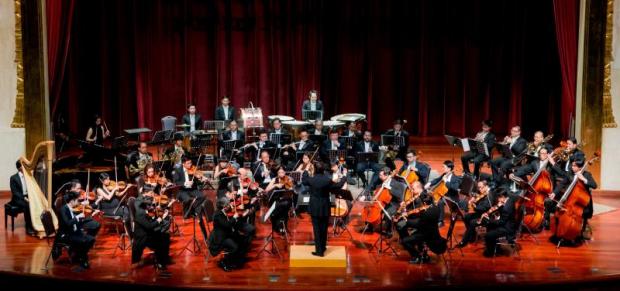So you thought you knew everything about Peter Ilych Tchaikovsky? His morbid Pathetique? His romantic Romeo And Juliet? His warmongering 1812 Overture? Well, think again. Royal Bangkok Symphony Orchestra is offering on Friday a major work by Tchaikovsky which is rarely played these days -- but counts, in its original form, as one of the most celebrated works in the history of music.

Royal Bangkok Symphony Orchestra. Photos courtesy of Bangkok Symphony Orchestra Foundation
The "premiere" of his Andante Cantabile for cello and orchestra may be familiar when you hear it on Friday night. But this was never the way Tchaikovsky heard it. When he composed his First String Quartet, the already-famous composer was elated that it received pretty good reviews from the critics. Yet the second movement, the original Andante Cantabile (the Italian words mean "moving like a song"), had a unique history and made one of the most famous writers in history have a crying streak -- while the most famous deaf woman in history felt emotionally elated.
That comes later. For the Royal Bangkok Symphony Orchestra programme includes a second cello work, this one with a small scandal behind it. Tchaikovsky loved Mozart, and when commissioned to write a work for cello, he came up with the Rococo Variations. That style -- in late 18th century art and music -- was in between perfectly balanced Classical and breaking-loose Romantic: it was florid, graceful, but not exactly balanced or symmetrical.
Knowing comparatively little about the cello, he asked a local cellist, one Wilhelm Fitzhagen, to "look it over", see if any of the cello parts could be improved. Mr Fitzhagen not only looked it over, he rewrote parts of it, changing much of the original music.
Later, when the composer saw the fixes, he first reacted with violence. A few moments later, he reacted like writers react when an editor changes his work. Tchaikovsky shrugged his shoulders and said -- literally -- "To hell with it. Let's not bother the music as it is".
One doesn't believe that the notable cellist Apichai Leamthong would shrug his shoulders about either of these two works. The artist, unlike so many Thai "serious" musicians, began his career studying Thai classical music at Chulalongkorn University. Perhaps it was the rare cello-like saw sam sai which prompted him to take up the cello here, and following graduation, he went to London's Guildhall School studying with one of the great names in cello literature, Stefan Popov. Later, he returned to Guildhall for further study with the great Rafael Wallfisch, and collaborated with the finest names in musical literature including Mstislav Rostopovich, Sir Colin Davis and the late Sir Neville Marriner.
Before returning to his native Bangkok, Mr Apichai represented the Guildhall String Quartet at a String Quartet festival in London and Guildhall Symphony Orchestra for Rostropovich's Evian Music festival in France, later joining the Asian Youth Orchestra, performing around the world.
In Thailand, he is a frequent guest at concerts. In 1992-1993, he joined the Asian Youth Orchestra, performing in major cities throughout Asia and Europe. Currently, he is assistant principal cellist of the Royal Bangkok Symphony Orchestra, director of undergraduate studies at Rangsit's Music Conservatory, and a founding member of the Bangkok String Quartet.
Two other major works are on this fairly romantic programme. The dynamic Japanese conductor Hide Shindori will open the Royal Bangkok Symphony Orchestra programme with Sir Edward Elgar's Salut D'Amour -- a celebration of love. This was based on a poem written by his fiancé, called Love's Grace. Elgar changed the title to Love's Greeting, his publisher changed it to Salut D'Amour, changed the composer's name to "Ed" Elgar, and it soon became a mainstay of 1888 salon music.
Mr Shindori, though, is more than a "salon" conductor. After studying in Japanese conservatories, including with Seiji Ozawa, he studied at Moscow State Conservatory, and later at Covent Garden with, among others, Bernard Haitink and Christoph von Dohonani. Since then he has worked as guest conductor in Europe and Japan, and collaborated with artists like Gil Shaham.
His experience in opera might stand him in good stead with the final work on the programme, Beethoven's Seventh Symphony. This was the symphony which Richard Wagner called "the apotheosis of the dance", though another composer, Carl Maria von Weber, said that the second movement made Beethoven "ready to go into the madhouse".
Perhaps the best description of this comes from the writer Antony Hopkins, who said: "This work gives us total spontaneity. The notes seem to fly off the page as we are borne along in a flood tide of inspired invention. Beethoven himself spoke of it as 'one of my best works'. Who are we to dispute his judgement?" We return, though, to those questions asked earlier about the effects of the original Andante Cantabile. Helen Keller, the iconic American heroine who was deaf, mute and blind, used to listen to this piece and "said" that the vibrations gave her a sublime joy.
She wasn't the only notable to love it. The great novelist Leo Tolstoy wrote to Tchaikovsky that when he heard that movement, he burst out crying with emotion. Yet when somebody asked the composer how he was inspired to write such "wonderful profound theme", Tchaikovsky answered: "Actually, I needed my house painted, and the house-painter was humming a song which begins, 'Oh, I love to sit on my couch, smoking my pipe'. That was the theme I used in the Andante Cantabile."
And that is how genius turns an everyday occurrence into an eternal treasure.

Apichai Leamthong. Bangkok Symphony Orchestra Foundation

Hide Shindori. Bangkok Symphony Orchestra Foundation
